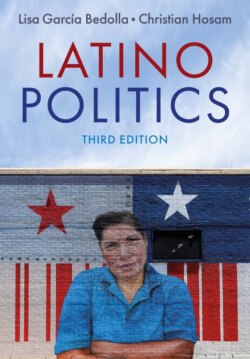Читать книгу Latino Politics - Lisa García Bedolla - Страница 16
Gender: Latino Politics and Intersectionality
ОглавлениеGender19 identity also interacts with ethnoracial categories in ways that affect Latino incorporation patterns. Appreciating intersectionality – the idea that human beings possess multiple identifications simultaneously, and that the intersection of those identities has important implications for their beliefs, attitudes, and experiences – is important for understanding Latino political engagement. Studies have shown that female- and male-identified Latinos migrate for different reasons, and that cisgender women now make up a growing proportion of Latino migration streams. In the early twentieth century, Latin-American-origin migration was quite male-dominated; by the early twenty-first century, that trend had shifted, with growing numbers of Latin-American-origin women choosing to migrate to the United States. Gender ratios among the foreign-born vary in important ways by national origin and by legal status.20 The majority of Dominican migrants, for example, are female-identified, while there are more male-identified than female-identified Mexican migrants. Unauthorized migration flows, in addition, tend to be heavily male-identified, and more than three-quarters of the United States’ unauthorized migrants come from Mexico and Central America. These gender differences have their roots in social and economic forces within the home countries, and have an effect on immigrants’ integration experiences in the United States.
One key aspect of those experiences is how those who are male- or female-identified are treated by US immigration policy. Studies suggest that immigration policies that, on the surface, seem gender-neutral, in practice have very different consequences for male- and female-identified migrants.21 In 2004, 73.2 percent of female-identified migrants applying for employment-based visas did so as a dependent of a visa holder; only 26.8 percent were primary visa holders. Similarly, under family reunification, women often must apply for sponsorship by male family members, requiring long waits before they are allowed to migrate to the United States and making them dependent on male family members for their migration status. These differences, in turn, affect female-identified migrants’ ability to settle and work in the United States.
In response to their particular structural positions, female-identified migrants engage in social network activity differently from male-identified migrants, and experience socioeconomic trajectories that vary from those of men.22 Those differences in terms of labor market structures and network relationships have a direct impact on how female-identified migrants engage with the political system. Of course, these gender differences are not only present among immigrants: native-born Latinos also vary in terms of gender roles, social network relationships, and economic opportunity structures. Therefore, it is important to consider the role gender differences play in helping to frame how male- and female-identified Latinos choose to engage in political activity. Using an intersectional lens is important, then, for understanding the complexity of Latino political experiences in the United States.
That lens needs to include other factors as well. Sexuality and gender identity are also important lines of demarcation among Latino migrants. Many recent LGBTQ Central American migrants petitioning for asylum in the United States are doing so to flee the violence and discrimination they face in their home countries; transgender migrants are among the most vulnerable in this regard.23 Unfortunately, since the Trump Administration began requiring that these asylum seekers remain in Mexico while waiting for the adjudication of their asylum claims, many face similar discriminatory violence in Mexico as well.24 If they are allowed entry into the United States, they likely will face discrimination there, experiences that will, in turn, affect their life chances and how they are able to, and choose to, engage politically.
